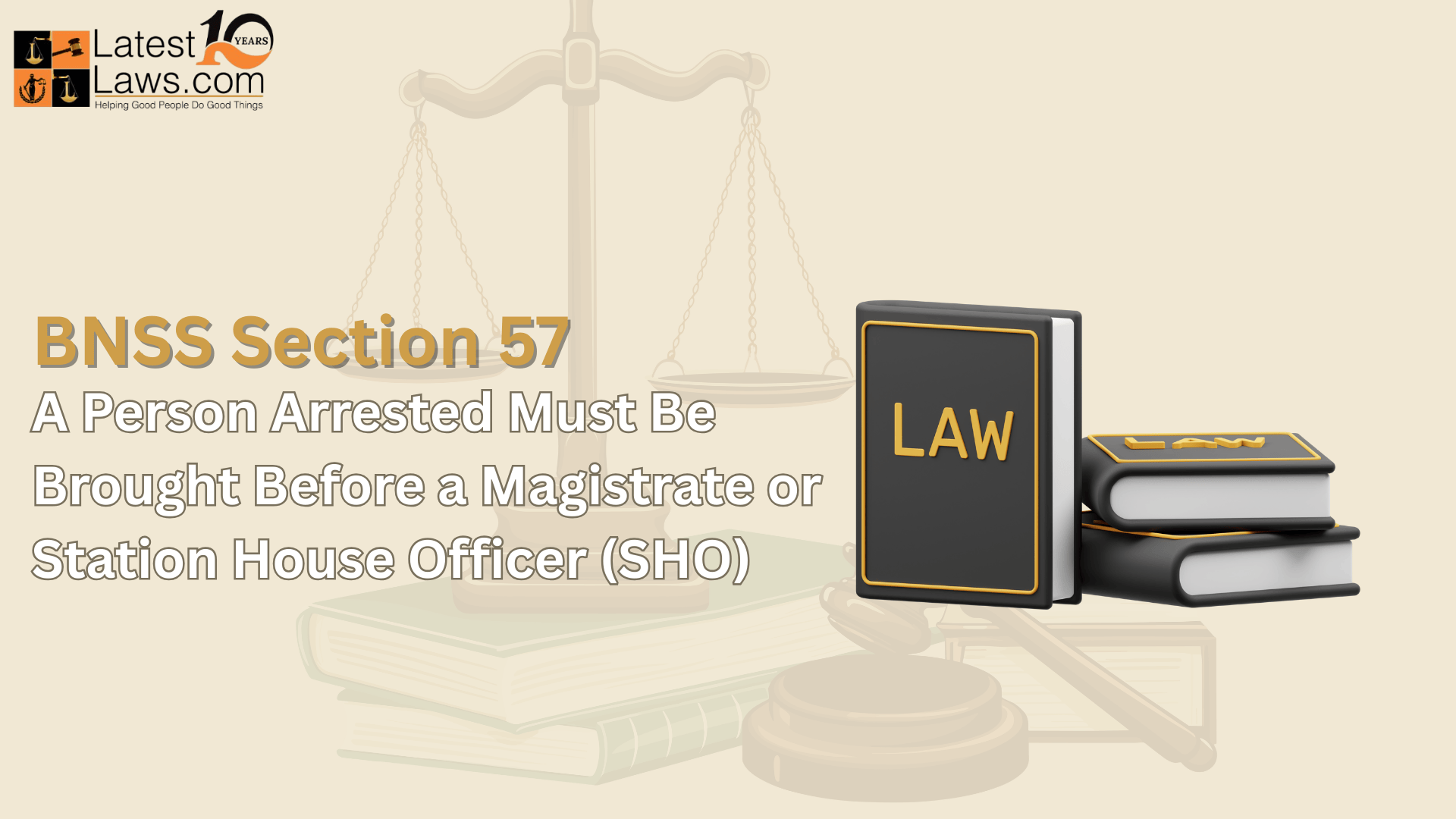Sponsor
BNSS Section 57: A Person Arrested Must Be Brought Before a Magistrate or Station House Officer (SHO)

What This Section Says, Simply
When someone is arrested by a police officer without a warrant—meaning there’s no written court order—the law states they must be taken, without unnecessary delay, either:
-
Before a Magistrate who has legal power in the case, or
-
To the police station’s officer in charge (often called the Station House Officer or SHO).
This rule aims to protect the arrested person’s rights and ensure proper legal oversight from the start.
Why It Matters: The Purpose Behind the Rule
-
Protection of Personal Liberty
Arrest is a serious step. Immediately involving a Magistrate or SHO helps ensure that the person isn't held unlawfully or for too long without judicial review. -
Checks and Balances
By involving a magistrate or senior police officer quickly, the system avoids misuse of power. It keeps the investigation fair and transparent. -
Fair Access to Justice
The arrested individual can raise objections—like claiming unlawful arrest or demanding bail—and get prompt attention. -
Legal Oversight from Day One
A magistrate can assess the legality of the arrest early and guard against rights violations from the beginning.
Breaking It Down: How This Works in Practice
A. The Moment of Arrest
When an officer arrests someone—say, for theft, assault, or suspicion of a crime—it’s often spontaneous, as they don’t need to get a court’s permission first (no warrant required).
B. No Delay Allowed
“No unnecessary delay” means the person should be brought before the magistrate or SHO within a short time—typically 24 hours. That’s to avoid arbitrary detention. Courts consider significant delays as violations of constitutional rights.
C. Who Counts as “Magistrate”?
A Magistrate is a judicial officer authorized to oversee criminal matters—such as a Judicial Magistrate First Class or a Metropolitan Magistrate. The law allows flexibility, so wherever there's jurisdiction, the police can present the arrested person.
D. Role of the Officer in Charge (SHO)
If a Magistrate isn’t immediately available—say late at night—the officer in charge of a police station can oversee the arrest until the person is formally produced before the magistrate. The SHO must still act in line with legal standards and inform the magistrate as soon as possible.
When Bail Comes Into Play
The law says “subject to the provisions as to bail.” Here’s what that means—just enough to cover the basics:
-
If the offense is bailable, the arrested person can request release upon furnishing bail.
-
If non-bailable, they must wait before a magistrate to seek bail or detention.
The key is prompt legal review. The court or SHO helps decide whether bail is appropriate, based on factors like the severity of the offense, prior record, risk of flight, etc.
Example 1: Midnight Arrests
Imagine a police officer arrests someone at 3 AM for suspected burglary. No magistrate is on duty at that hour. What happens?
-
The officer takes them to the nearest police station and notifies the SHO.
-
The SHO reviews the arrest and ensures the person is safe and lawfully held.
-
The next morning, they are taken promptly before a Magistrate—likely well within 24 hours—to review the case.
This safeguards human rights even during off-hours.
Example 2: Rural Arrest Without Nearby Court
Suppose someone is arrested in a distant village far from a town or magistrate’s court.
-
The police may hold the person at the local patrolling post or station.
-
The SHO there must arrange transportation and paperwork to take the person to the nearest magistrate as soon as possible.
-
Delay beyond a reasonable time could render the arrest invalid.
The law is flexible, but always points toward timely access to legal oversight.
Also read: BNSS Section 47
Frequently Asked Questions (FAQs)
1. What does “without unnecessary delay” mean in this context?
It means the arrested person should be produced before a magistrate or SHO promptly—typically within 24 hours. Courts view delays beyond that as violations of rights.
2. Can the police officer hold the person at the station indefinitely?
No. Holding indefinitely without bringing the arrested person before a magistrate or SHO is unlawful. The law requires prompt judicial or supervisory oversight.
3. Who is considered a Magistrate here?
It could be any magistrate authorized by law in that jurisdiction—like a Judicial Magistrate First Class or Metropolitan Magistrate. The key is the person has legal authority over the case area.
4. What if no magistrate is available right away?
The officer in charge of the police station (SHO) temporarily oversees the custody and must ensure the person appears before a magistrate at the earliest possible time (usually within 24 hours).
5. Does bail automatically apply here?
Not automatically. If the offense is bailable, the person may request bail; otherwise, they must wait before the magistrate to apply. The law says “subject to the provisions as to bail,” meaning bail depends on the nature of the offense.
6. What’s the purpose of bringing someone before a Magistrate quickly?
It protects individual rights, ensures oversight, prevents misuse of power, and guarantees that the arrest is lawful and justified from the beginning.
7. Is this rule part of wider criminal law?
Yes. It’s aligned with constitutional principles ensuring protection of life and personal liberty, and follows rules similar to other countries’ laws on arrest and judicial supervision.
Why BNSS Section 57 Is Important
BNSS Section 57 acts as a powerful safeguard. It makes certain that whenever someone is arrested without a warrant:
-
They’re not left in legal limbo.
-
A magistrate or qualified police officer supervises the situation quickly.
-
Their rights are protected from the beginning—particularly around detention and bail.
-
The legal process starts transparently.
By ensuring prompt judicial oversight and legal review, the law upholds fairness, transparency, and trust in the justice system—critical for individuals and the broader public.



